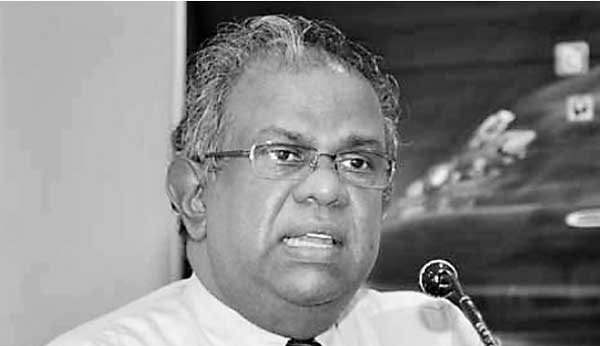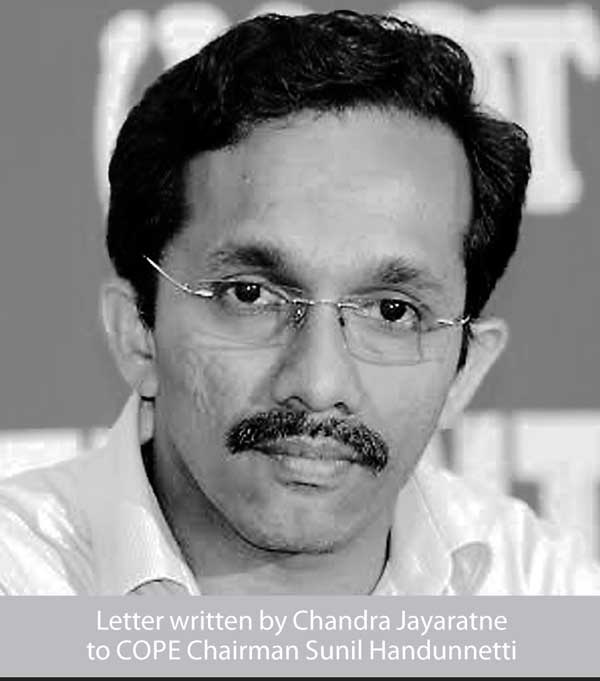Do you know this?
Posted on July 9th, 2016
Chandra Jayaratne Courtesy The Daily Mirror
The former Chairman of the Ceylon Chamber of Commerce and civil rights activist Chandra Jayaratne has written to the Chairman of the Committee on Public Enterprises (COPE) Sunil Handunnetti, drawing his attention to the General Principles of Accountability of an Oversight Committee of Parliament and issues related to the infamous ‘Bond’ issue.

In the letter he says:
Committee on Public Enterprises” – address the challenging task of developing and presenting, an independent, professional, unbiased and value adding report to Parliament, on the Bond Issues made by the Public Debt Department of the Central Bank in 2015 and 2016, including the controversial issues that have led to significant public
criticism on account of;
Purported violation of expected best practices of due process, good governance, transparency and professionalism, in a backdrop of these bond issues being tainted, possibly by conflicts of interest, related party transactions, market manipulations and insider information;
The State purportedly incurring significant future higher than optimum market interest payment costs over an extended period of years;
The beneficiary members of State-run Employees Provident Fund, Employees Trust Fund, Savings and Insurance entities may have lost the competitive, market-based best returns, having invested via the secondary market, instead of the primary markets;
A limited number of connected parties may have benefited significantly by way
of unjust enrichment
In the above context, it may be best that you and the Committee members refresh your memory with the General Principles of Accountability of an Oversight Committee of Parliament. Towards this task I enclose extracts from an OECD/DAC Governance network and South African Parliament dealing with these Principles of Accountability, especially those highlighted and underlines. (Refer Box)
You and other members should also bear in mind that Sri Lankan Legislative Enactments dealing with Bribery and Corruption, clearly defined in Section 70 of such enactment, what constitutes Corruption in relation to any Public Servant – (See Right).
You will note from this provision that, where any public servant, with intent to cause wrongful or unlawful loss to the Government or to confer a wrongful or unlawful benefit/favour/advantage on himself, or any person, with knowledge that a loss will be caused to any person or the government, does any act which he is empowered to do or induces any other public servant to perform or refrain from performing any act or uses information coming to his knowledge or participates in making of any decision or induces any other person, directly or indirectly to perform or refrain from performing any act, shall be guilty of the offence of corruption.”
Principles of Parliamentary Assistance

OECD/DAC Network on Governance (Extracts)
Parliaments perform a vital role in any system of representative democracy, but they play an especially important role in emerging democracies – not only in improving the quality of governance by ensuring transparency and accountability, but also in shaping the public’s expectations and attitudes
to democracy.
A Parliaments is the single most important institution in overseeing government activity, scrutinising legislation and representing the public’s concerns to those in power. Their performance in holding the government to account and engaging with voters will help to establish the norms and values in the early years of a democratic culture.
Parliaments and domestic accountability
The overarching purpose of parliamentary oversight is to hold government to account. While governments are directly accountable to voters at elections, in between elections it is the duty of parliamentarians to hold ministers and their departments to account on the public’s behalf.
The Inter-Parliamentary Union’s Tools for Parliamentary Oversight sets out four key
oversight roles:
Transparency and openness. Parliament should shed light on the operations of the government. It provides a public arena in which the government’s policies and actions are debated, exposed to scrutiny and held up to
public opinion.
Delivery. Parliamentary oversight should test whether the government’s policies have been implemented, and whether they are having the desired impact.
Value for money. Parliament needs to approve and scrutinise government spending. It should highlight waste within publicly-funded services, and aim to improve the economy, efficiency and effectiveness of government expenditure.
- Tackling corruption and misuse of power. Parliament should protect the rights of citizens by detecting and preventing abuse of power, arbitrary behaviour and illegal or unconstitutional conduct by the government.
In short, a parliament’s role is to provide a check on the activity of the government. The role might be thought of as providing government by explanation”. That is, highlighting issues of concern and ensuring that the government is able to justify its actions to the public, or where that policy is deficient, forcing a change. The tools available to MPs to achieve these objectives vary from parliament to parliament, but they tend to be pursued through three main routes, namely via the plenary session (through questions and debates), the committee system (through investigations) or in conjunction with outside agencies that report to parliament.
It is in this last area where parliaments have the potential to be most effective in strengthening systems of domestic accountability. Parliaments derive much of their authority from the fact that a number of accountability institutions usually report to them. Such institutions provide a wealth of information on the performance of government in specific policy areas, and provide the evidence on which parliament can hold ministers, and ministries, to account. The true test of democracy is the extent to which Parliament can ensure that government remains answerable to the people. This is done by maintaining constant oversight (monitoring) of
government’s actions.
approve and scrutinise government spending. It should highlight waste within publicly-funded services, and aim to improve the economy, efficiency and effectiveness of government expenditure.
Tackling corruption and misuse of power. Parliament should protect the rights of citizens by detecting and preventing abuse of power, arbitrary behaviour and illegal or unconstitutional conduct by the government.
In short, a parliament’s role is to provide a check on the activity of the government. The role might be thought of as providing government by explanation”. That is, highlighting issues of concern and ensuring that the government is able to justify its actions to the public, or where that policy is deficient, forcing a change. The tools available to MPs to achieve these objectives vary from parliament to parliament, but they tend to be pursued through three main routes, namely via the plenary session (through questions and debates), the committee system (through investigations) or in conjunction with outside agencies that report to parliament.
It is in this last area where parliaments have the potential to be most effective in strengthening systems of domestic accountability. Parliaments derive much of their authority from the fact that a number of accountability institutions usually report to them. Such institutions provide a wealth of information on the performance of government in specific policy areas, and provide the evidence on which parliament can hold ministers, and ministries, to account. The true test of democracy is the extent to which Parliament can ensure that government remains answerable to the people. This is done by maintaining constant oversight (monitoring) of
government’s actions.
Constitutional Mandate
The Constitution states that Parliament has the power to conduct oversight of all organs of state, including those at provincial and local government level.
WHAT IS OVERSIGHT?
Oversight is a function granted by the Constitution to Parliament to monitor and oversee government actions.
When exercising oversight, Parliament focuses on the following areas:
implementation of laws
application of budgets
strict observance of laws of Parliament and the Constitution
effective management of government departments.
WHY IS the PARLIAMENT’S OVERSIGHT ROLE IMPORTANT?
By overseeing the actions of the government, Parliament is able to ensure that service delivery takes place, so that all citizens can live a better quality life.
PARLIAMENT EXERCISES OVERSIGHT FOR THE FOLLOWING REASONS:
to detect and prevent abuse
to prevent illegal and unconstitutional conduct on the part of the government
to protect the rights and liberties of citizens
to hold the government answerable for how taxpayers’ money is spent
to make government operations more transparent and increase public trust in the government
THE ROLE OF PARLIAMENTARY COMMITTEES
Parliamentary committees are established as instruments of the Houses in terms of the Constitution to facilitate oversight and monitor the government.
These committees are the engine rooms” of Parliament’s oversight and legislative work.
Committees scrutinise legislation, oversee government action, and interact with the public.
One of the most important aspects of the oversight function is the consideration by committees of annual reports of organs of State, and reports of the Auditor-General. Depending on the purpose of the oversight, the Committee will either request a briefing from the organs of the State or visit it
for fact-finding.
OFFENCES OTHER THAN BRIBERY
70. Any public servant who, with intent, to cause wrongful or unlawful loss to the Government, or to confer a wrongful or unlawful benefit, favour or advantage on himself or any person, or with knowledge, that any wrongful or unlawful loss will be caused to any person or to the Government, or that any wrongful or unlawful benefit, favour or advantage will be conferred on any person.
70. Any public servant who, with intent, to cause wrongful or unlawful loss to the Government, or to confer a wrongful or unlawful benefit, favour or advantage on himself or any person, or with knowledge, that any wrongful or unlawful loss will be caused to any person or to the Government, or that any wrongful or unlawful benefit, favour or advantage will be conferred on any person.
– See more at: http://www.dailymirror.lk/112194/Do-you-know-this-#sthash.elNwkcaa.dpuf